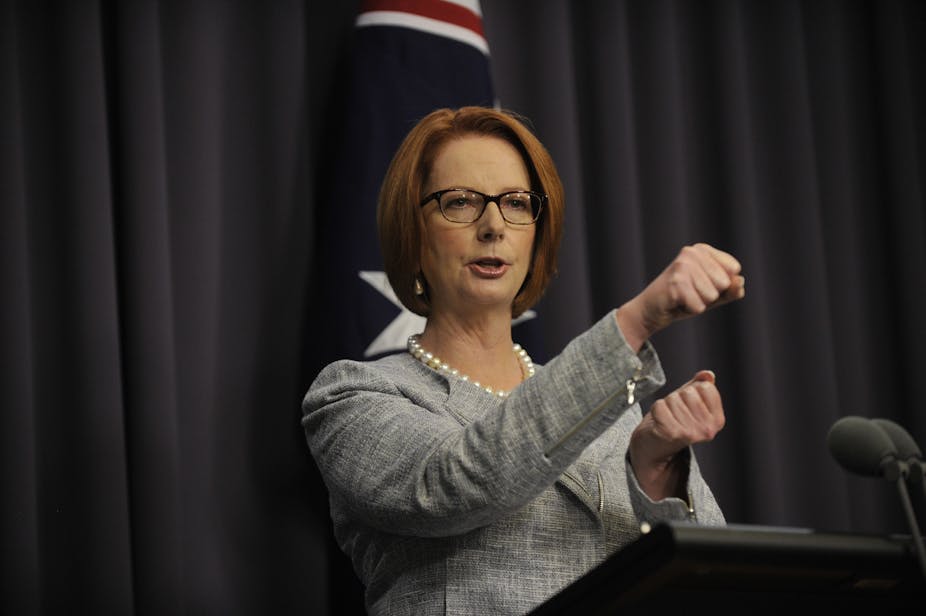Among all the self-serving tattle from disgruntled cabinet ministers who felt impelled to resign last week, surely the stupidest was the attack on Julia Gillard supposedly promoting “class warfare”.
The man who set off last Thursday’s extraordinary chain of events, then cabinet minister Simon Crean, claimed:
The Labor party has always operated most effectively when it has been inclusive, when it’s sought consensus, not when it has sought division, not when it has gone after class warfare.
I am no great fan of everything the prime minster has done, but at least she and Treasurer Wayne Swan have sought to somewhat limit the extent to which inequality is increasing in Australia. If this is class war, I am not sure what her critics would have her do.
In the case of former resources minister Martin Ferguson it seems reasonably clear. He has been an assiduous defender of the mining industry, and as part of this sought to weaken attempts to reduce carbon emissions and make sure the worst polluters are compensated from general tax revenues.
That his resignation is regretted by the mining industry is hardly an indication of his deep commitment to the “Labor values” he likes to speak of.
In a capitalist society, governments need to engage with business, and at a time when unions no longer represent a majority of the workforce it becomes difficult for a government to rely upon organised labour as its primary base.
When Gillard proclaimed to her friends in the union movement that Labor was not a progressive or a social democratic party, but primarily a workers’ party, I too cringed. But Gillard’s critics are not attacking her for abandoning a broader progressive vision.
Rather, it seems there is a strange alliance between the majority of the Canberra press gallery and the strongest supporters of Rudd to argue that Labor has moved away from the middle ground, even when the attacks on Gillard come from some of those who have most enthusiastically supported the interests of the establishment.
Ironically while Kevin Rudd and Wayne Swan are now depicted as deeply opposed, they both have used the pages of The Monthly to write trenchant critiques of the neo-liberal market policies that unleashed the global financial crisis.
But whatever internal fights are now destroying Labor, they have lost all ideological consistency: whatever “right” and “left” may mean in the larger world, they explain nothing about the current views of the Labor caucus except tribal loyalties and the need to preserve pre-selection.
Not a single supporter of last week’s aborted Rudd challenge articulated what policies would change were their man to be re-elected leader.
The Rudd who wrote so eloquently about the moral challenges of climate change and the immorality of unbridled capitalism is surely not the man Crean and Ferguson now tell us will abandon “class warfare” (which might mean higher taxes on the rich, and less social welfare for the middle class).
Not one critic of either leader has suggested that their vote might be influenced by decent support for those who are unemployed - that is left to the Greens to argue.
The current story about the Labor party is one that paints the Hawke/Keating period as a golden age of consensus, good government and deregulation to which we need return. That their economic reforms were accompanied by the reintroduction of universal health insurance and carefully targeted improvements in social welfare is less commonly remembered, at least in the Murdoch press.
Martin Ferguson specifically called for an emphasis on “investment, jobs and training” - all of which have been consistent themes of Gillard as prime minister. It is difficult to point to any significant policy decision of this government that is inconsistent with those followed by the previous Labor governments of 1983-1996.

The Age newspaper editorialised on the weekend that Labor needs “a fresh commitment to building this country’s economy, its infrastructure, health and education systems for the next generation”. That line could have come straight from Julia Gillard’s address to parliament on Thursday, and is equally vague on any explanation that new commitments will require new sources of government revenue.
There is much to criticise in the current government, but it is rarely heard from within the party, and almost never from either the opposition or the mainstream media.
Every suggestion for a fairer system of tax and government support is met by cries of “class warfare”, whether it is to limit subsidies to already rich private schools or to increase tax on high end superannuants. As a beneficiary of the Howard reforms I know just how well off I am because of them - and how unsustainable they are.
Yes, the government should “govern for all Australians”: a phrase that has become doggerel in every piece of political commentary over the past few weeks. But governing for all means accepting what social research has shown, namely a more equal society is one in which we are all better off.
If every attempt to create more equality is met by accusations of “class warfare”, no government will dare introduce genuinely radical policies.
At this point the Gillard government is almost certainly not re-electable. But for the prime minister to turn her back on the progressive and social democratic tradition of her party out of fear of attacks on class warfare leaves the Greens as the only defenders of what used to be the raison d’etre of the Labor party: to protect the weakest and most vulnerable members of our society.

